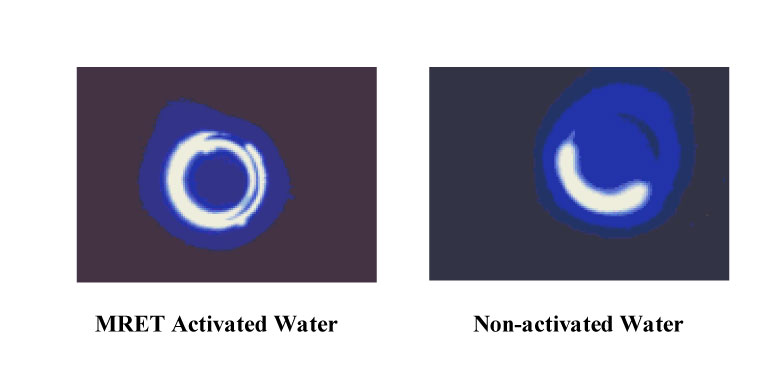Biological and Microbiological Properties of MRET Activated Water
Molecular Resonance Effect Technology (MRET) water activator is patented in the USA by Dr. Igor Smirnov in February 2000, Patent No.6022479. MRET water activator is the stationary source of subtle, low-frequency, resonant electromagnetic field with composite structure. MRET Activated Water has modified molecular structuring, physical and electrodynamic characteristics and is compatible with the cell water polarized-oriented multilayer molecular structuring described by Dr. Gilbert N. Ling. Such similarity contributes to easy bio-availability and fast assimilation of MRET water in biological systems. Due to its “super liquidity” MRET water easily penetrates through small porous and capillaries in the body, improves hydration and stimulates the proper function of cells in biological systems.
Research in animal models confirmed: MRET water hydrates the cellular structures in the body, enhances the intracellular/extracellular water exchange and homeostasis; it also substantially increases the main factors of natural cellular resistance to infections and inflammations such as phagocytosys (engulfing of alien cells) and immune response.
Oncology research on 500 mice: MRET water increased the life span by 61% (during 3 weeks experiments).
Staphylococcal infection research on 400 mice: 0% death rate on MRET water verses 30% death rate on regular water (during 9 days experiments).
Scientific investigations in vitro confirmed: MRET water significantly inhibits the growth of bacteria, viruses and mutated cells.


MRET activated water and its successful application for preventive treatment and enhanced tumor resistance in oncology
The investigation regarding the effects of different fractions of MRET water on tumor resistance in animal model in case of oncology disease was conducted at Kiyv Institute of Experimental Pathology, Oncology and Radiobiology of Ukrainian Academy of Science.
The goal of this investigation was to study on mice the effect of MRET activated water as a potential agent for the prevention and treatment of two kinds of oncology diseases (laboratory models of Ehrlich’s ascites tumor and Sarcoma ascites form). Significant positive effect of MRET activated water regarding the tumor resistance on animals was observed in the experiments conducted on 500 mice (22 groups with 20 mice in each group and 10 groups with 5 mice in each group). The best results were observed in the groups of mice on MRET water activated for 30 minutes (optimal regime of activation). The substantial anti-tumor efficacy was confirmed by very high level of reduction of Total Number of Viable Tumor Cells by 76% in “preventive treatment” and by 55% in “therapeutic treatment” regime. The life span of mice which received optimal activated water increased by 61% in “preventive treatment” and by 43% in “therapeutic treatment” regime. The significant anti-tumor effect of MRET Activated Water on mice was close to the action of the chemotherapy agents and allowed to avoid the side effects that typically follow chemotherapy treatment in oncology.

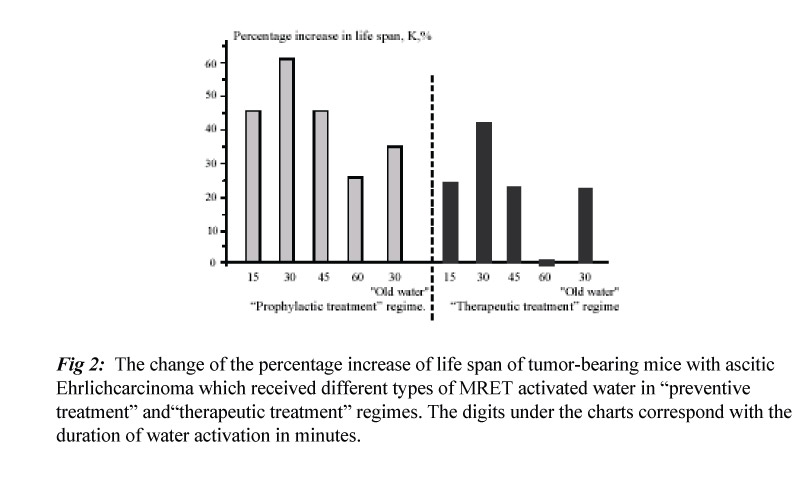
The comparative picture of tumor-bearing mice on Non-activated water and on MRET activated water
(optimal activation time 30 minutes) is presented on Fig 3.
![]()
![]()
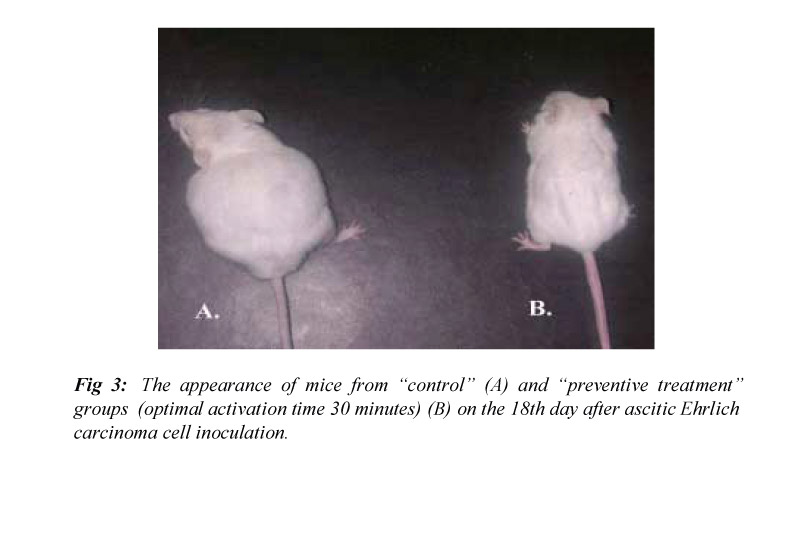
The rebounding effect of MRET water on White Blood Cells counts of patient undergoing chemotherapy treatments
The clinical observation was conducted on the patient of Cedars-Sinai Comprehensive Cancer center, Los Angeles, USA diagnosed with metastasized naso-pharyngeal cancer. The observation showed that the ingestion of MRET water compensated the usual side effects of chemotherapy treatments such as long-term decrease of White Blood Cell counts (WBC), weakness, headache, nausea, etc. On a regular basis, WBC counts usually decrease to very low level. The rebounding of WBC from this low range takes about 2-3 weeks. The ingestion of MRET water prevented the decrease of WBC counts to their lowest level and helped to regain the pre-chemotherapy level within unusually short period of time of 3 days.
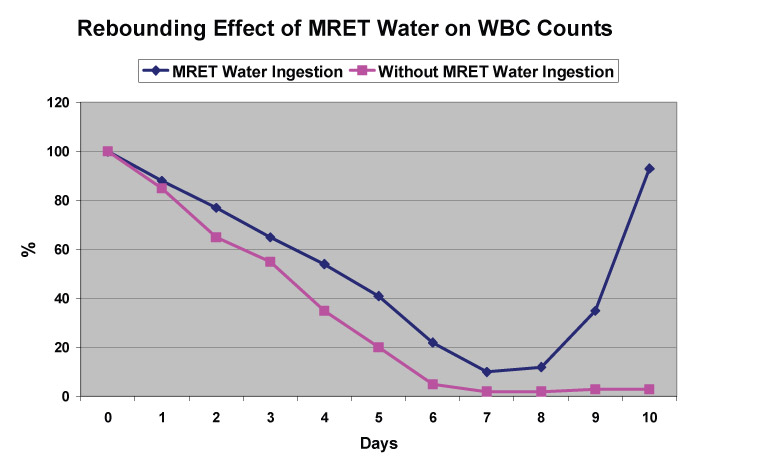
Thus, the clinical observation revealed that on the 10th day after the beginning of chemotherapy (in 3 days after WBC counts dropped to 10% of pre-chemotherapy level) WBC counts rebounded to 93% of their pre-chemotherapy level. In compliance with Student’s Distribution criteria the rebounding of WBC was higher than 70% of pre-chemotherapy level with p=0.05.
![]()
![]()
The effect of MRET activated water on Staphylococcal infection in vivo in animal model (on the cells of immune system) and in vitro on the culture of Staphylococcus aureus Wood-46
The investigation regarding the effects of MRET water on staphylococcal infection was conducted at Kiyv National Shevchenko University, Ukraine in vivo on 400 mice and in vitro on the culture of Staphylococcus aureus Wood-46
I. The Effect of MRET Water on Staphylococcal Infection in vivo in Animal Model
1. Significant protective properties of MRET water.
The significant protective properties of MRET water were confirmed by substantial decrease of Staphylococcus CFU (colony forming units) in homogenate of kidneys of mice on MRET water compare to control group of mice following the intra-peritoneal staphylococcal infection after the first 24 hours. The analysis of data in the beginning of experiments leads to the conclusion that significant decrease of pathogen’s colonies in homogenate of kidneys of mice on MRET water begins only after 24 hours following the inoculation of Staphylococcus aureus. The results on 30 minutes activated water were much better than on 15 minutes activated water and all further experiments were conducted on 30 minutes activated water.
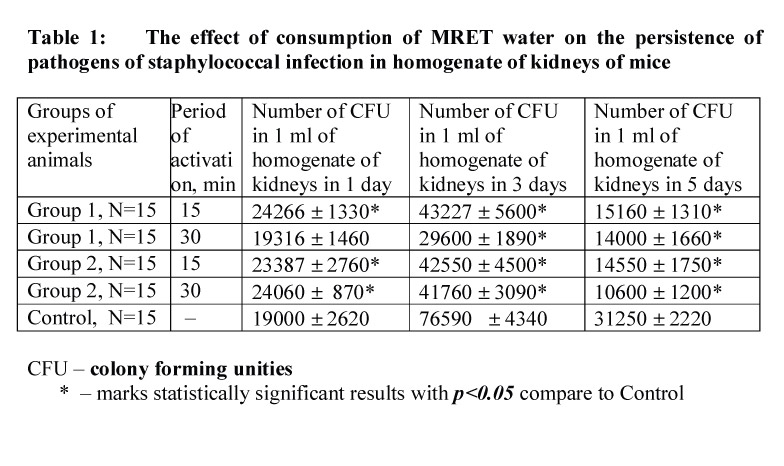
2. The consumption of MRET water reduced the death rate from 30% (control group) to 0% (MRET groups) during the first 9 days of experiment.
There was no case of animal death in all investigated groups within the first 24 hours after intra-peritoneal inoculation of Staphylococcus culture, which is a pretty standard result. During the next 8 days 30% of animals died in control group which is an expected result for such experimental procedure. There was no death case in both groups of mice that ingested MRET activated water and it is a very unusual result. Nevertheless, the main consequences of Staphylococcus infection do not manifest in death of animals as in case of oncology diseases. Staphylococcus virus affects the live systems and organs of the body. These pathogenic microorganisms cause inflammations, suppurations, abscesses, furuncles, quinsy, cepsical conditions, etc. That’s why a detailed investigation of the process of stimulation by MRET water of phagocytes and of lymphoid organs of immune system of mice infected with Staphylococcus aureus culture was conducted and is presented in this report.
3. The development of the local acute inflammation is essentially suppressed in case of ingestion of MRET activated water.
The local inflammation was induced with the help of the inoculation of Staphylococcus aureus culture into the hinder left paw. The ordinary inflammatory reaction was observed in the group of mice on non-activated water: the intensive reddening of the hinder left paw (Fig 1). Both groups of mice on MRET water did not develop any reddening of the hinder left paw inoculated with Staphylococcus aureus culture (Fig 2). The results of this experiment confirm the fact of the substantial inhibition of inflammatory infection in case of the regular consumption of MRET water.
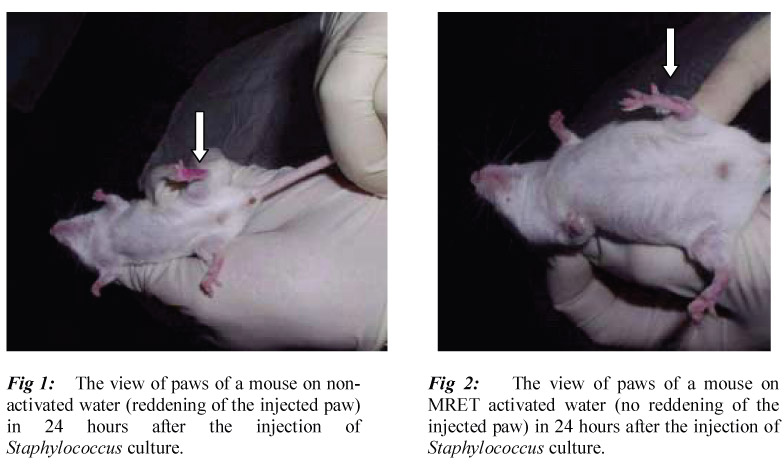
4. The consumption of MRET water stimulates the activity of phagocytic system and the level of natural resistance of animals to pathogenic microorganisms.
For the following series of experiments the inoculation of Staphylococcus aureus Wood-46 was conducted intra-peritoneal in dose LD30 in order to spread infection all over the body.
The phagocytic system is one of the main factors of natural non-specific cellular resistance to infections and inflammations. It is the first line of protection of an organism against penetration and reproduction of pathogenic microorganisms. The protective role of phagocytic cells is based on their capacity to identify, engulf and utilize the alien agents penetrated into internal environment of a macro-organism. Phagocytosis is the main mechanism of natural resistance especially at the first stage of contagious process; it is a regular part of formation of the specific immune response.
The most common methodology applied in the studies of the functional activity of phagocytes is the examination of their phagocytic (engulfing of alien cells) and oxygen-dependent bactericidal activity. Phagocytic activity of neutrophils and macrophages is estimated based on Phagocytic Index (percentage of phagocytes which engulfed test-bacteria) and on Phagocytic Number (average number of testbacteria engulfed by one phagocyte). The cultures of Staphylococcus aureus and Latex are usually used as test-bacteria. The oxygen-dependent bactericidal activity of phagocytes is studied with the help of NBT-test: an oxygen-dependent reduction of Nitro Blue Tetrazolium into an insoluble Diformazan of Nitro Blue Tetrazolium derivative by phagocytes. With the help of NBT-test it is possible to distinguish the activated phagocytes from the non-activated ones. MRET water stimulated the phagocytic capacities of neutrophils of a peripheral blood and peritoneal macrophages significantly increasing their phagocytic activity, particularly Phagocytic Index (Fig 3A, p<0.05) and Phagocytic Number (Fig 3B). It also stimulated their oxygen-dependent bactericidal activity, particularly the significant increase of quantity of NBT-positive phagocytes (Fig 4, p<0.05).
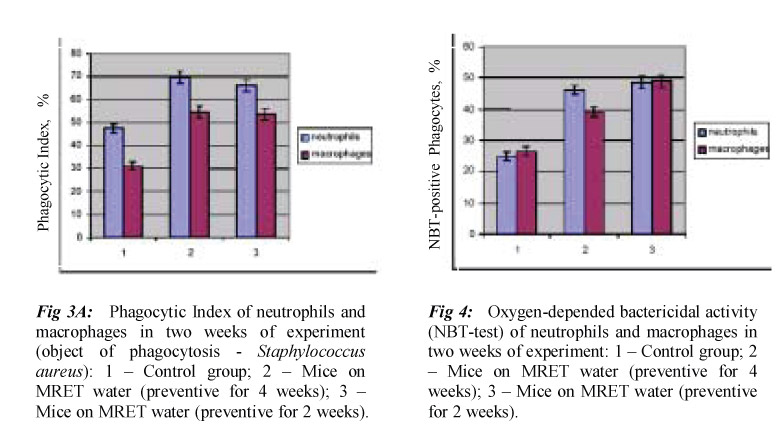
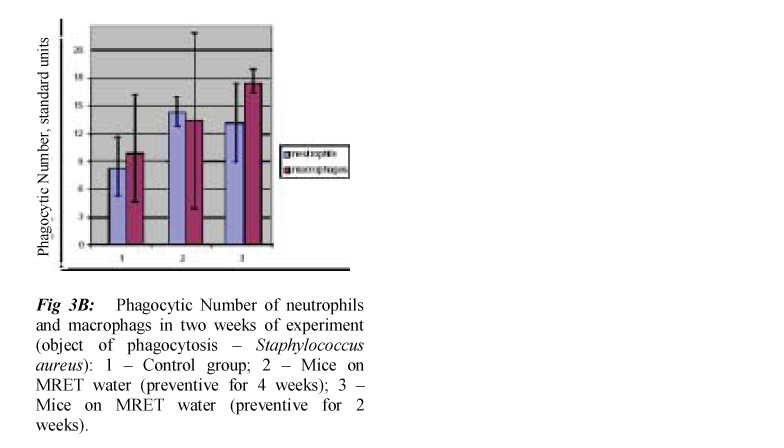
These experiments confirmed the increase of effective potentials of phagocytes, which constitute one of the main factors of natural protection of an organism and initiate the immune response.
5. The consumption of MRET water substantially enhances the immune activity of lymphoid organs.
By the end of another series of experiments in both groups of mice on MRET water was observed significant increase of the weight and the cellularity (quantity of cells) of a spleen and lymph nodes (p<0.05) as well as the insignificant increase of weight and cellularity of thymus (Fig 5 and Fig 6).
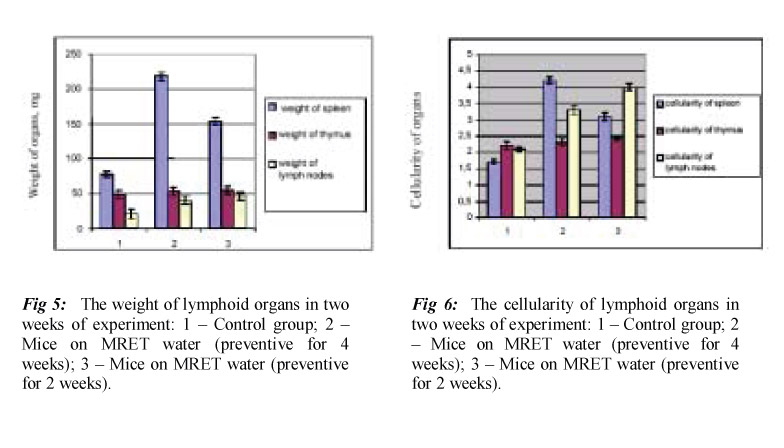
These results confirm the fact of significant intensification of immune system response in animals on MRET water subject to Staphylococcus infection. The difference in studied parameters between the groups of mice on MRET water (4 weeks and 2 weeks of preventive consumption of MRET water) was insignificant which confirms quite fast beneficial effect of MRET water on the immune activity of lymphoid organs. In the beginning of experiment the cellularity and the weight of lymphoid organs in MRET groups did not show the distinct tendency to modifications. It is reasonable to admit that the consumption of MRET water affects the weight and the cellularity of lymphoid organs only during the infection period.
CONCLUSIONS:
The consumption of MRET activated water significantly enhances the factors of natural resistance of the body which constitute the first line of protection of an organism against the penetration and reproduction of pathogenic microorganisms.
II. The Effect of MRET Activation on the Process of Growth of Staphylococcal Culture in Nutrient Medium
Following the investigation the direct correlation between times of activation (tact), initial concentrations of staphylococcal culture (N0) and a number of colonies grown on MRET activated nutrient medium were observed. The results are presented below in the form of a series of photos of Petri dishes with the grown colonies and the following diagrams based on the data of these experiments (Fig 7 – 12).
In the process of investigation the effect of MRET activation on the growth of staphylococcal culture at rather small initial concentration of pathogens was analyzed. The highly significant bacteriostatic effect of 92 – 93% was observed after MRET activation for 30 minutes and more of cultures with initial concentration Nο = 10³ bacteria/ml (Fig 7 and 8) and of 70 – 90% with initial concentration of N0 = 10² bacteria/ml (Fig 9 and 10). In case of cultures with low initial concentration N0 = 10 bacteria/ml the bacteriostatic activity in 15 minutes activated nutrient medium exceeded 93% and in 30 minutes activated nutrient medium was observed 100% inhibition of staphylococcal colonies (Fig 11 and 12).
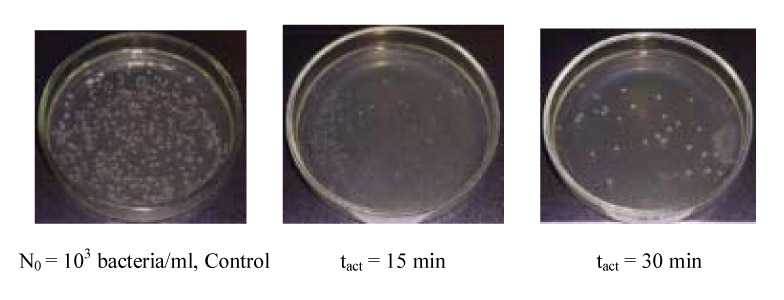
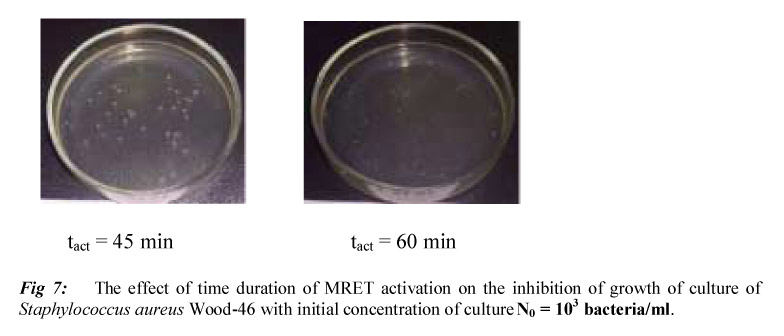
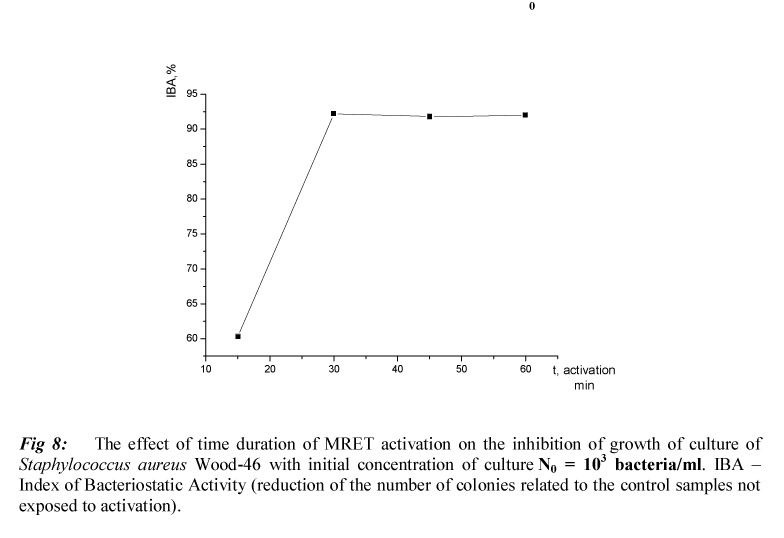
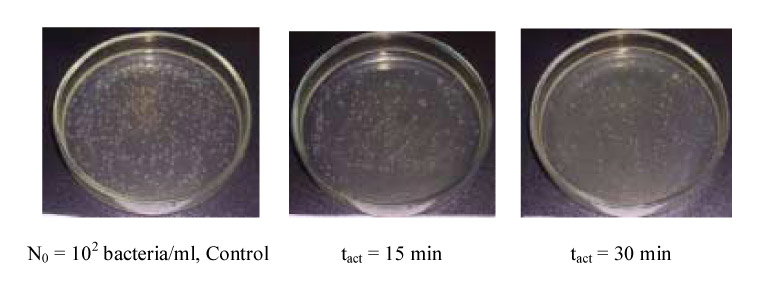
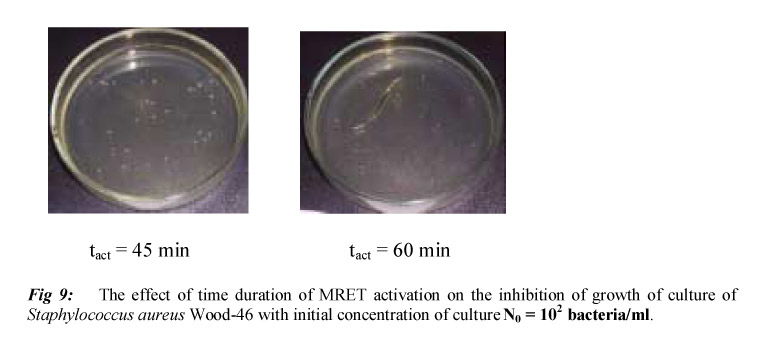
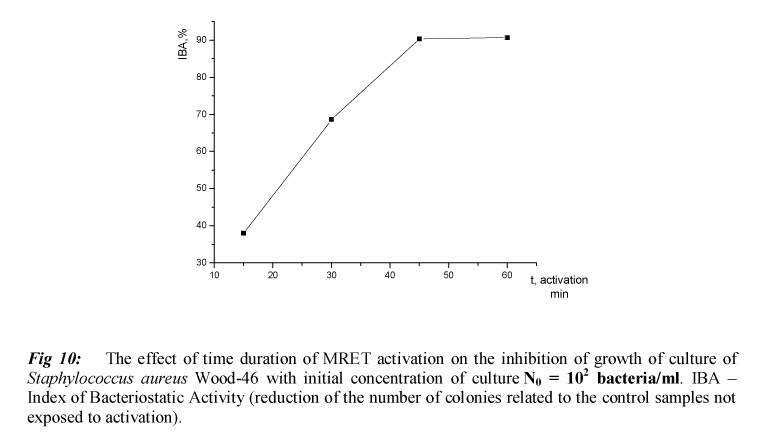
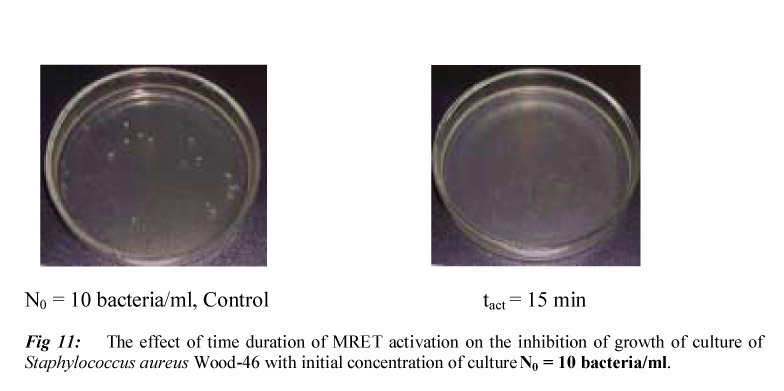
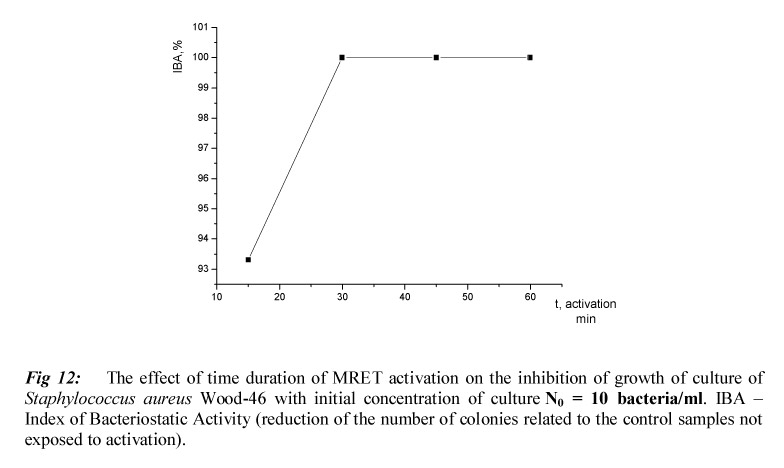
CONCLUSIONS:
The results of investigation provide the evidence regarding the high efficacy of MRET activation on the inhibition of growth of colonies and reproduction of staphylococcal microorganisms in vitro. These results allow admitting that the process of MRET activation and the sterilization effect of MRET water can be applied in food industry and for water purification.
Bioelectrical Impedance analysis confirmed enhanced hydration capacities of MRET water
The Bioelectrical Impedance analysis was conducted at Global Quantech, Inc., San Marcos, USA. The effect of MRET Water on the process of hydration of the body was tested on 8 human subjects in accordance with standard methodology with a help of FDA approved Bioelectrical Impedance instrumentation, model Imp SFB7.
The multi-frequency bioelectric impedance analysis showed that consumption of MRET Activated Water provided an immediate improvement in cells functions. In average the consumption of 6 ounces of MRET Activated Water within 20 minutes showed that water was moving from outside the cells to inside, that capacitance (cell energy storage) enhanced dramatically, and that water outside the cells was leaving the body. It proved that edema (water retention) was reduced and cells functions improved within 20 minutes. The consumption of 6 ounce of regular drinking water(control test) in average revealed the movement of water from outside the cells to inside only within 60 minutes. It means that MRET Activated Water was absorbed in the body three times faster than regular non-activated water.
The effect of MRET activated water on Escherichia coli K-12 and on Complex Microbiological Associations
The research was conducted at Kiev Institute of Microbiology and Virology of Ukrainian Academy of Science.
I. MRET activated water inhibitory effect on growth of conditionally pathogenic bacteria Escherichia coli K-12 in aerobic environment
The investigation revealed the significant effect of MRET-activated nutrient medium in aerobic environment on the process of growth and reproduction of E.coli microorganisms, their division, the size of colonies and the modification of forms of culture cells. It was observed that at low initial concentration of cells of investigated culture Escherichia coli K-12 MRET nutrient medium activated during 30 minutes and 60 minutes inhibited the growth of culture 27 and 303 times respectively during the 25 hours of experiment.
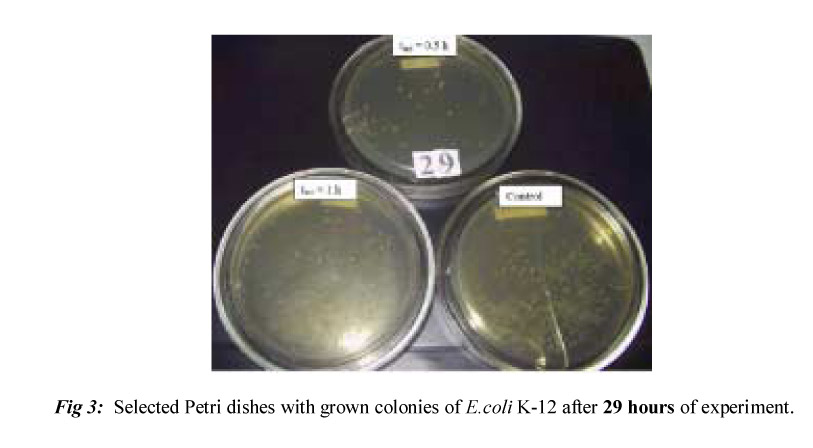
This experiment shows that MRET-activation process has very strong bacteriostatic effect on conditionally pathogenic E.coli microorganisms and that the inhibition of E.coli growth is more effective when activation time is increased. It was observed that at low initial concentration of cells of E.coli in nutrient medium MRET-activation during 30 minutes and 60 minutes period of time inhibited the culture growth NC/N0.5 = 27 and NC/N1.0 = 303 times respectively after 25 hours of experiment (Fig 4). Consequently, the level of bacteriostatic activity was 96% in 30 minutes activated nutrient medium and 99.7% in 60 minutes activated medium. Thus, the direct correlation between bacteriostatic activity of MRET-activated nutrient medium and the time of activation was confirmed.
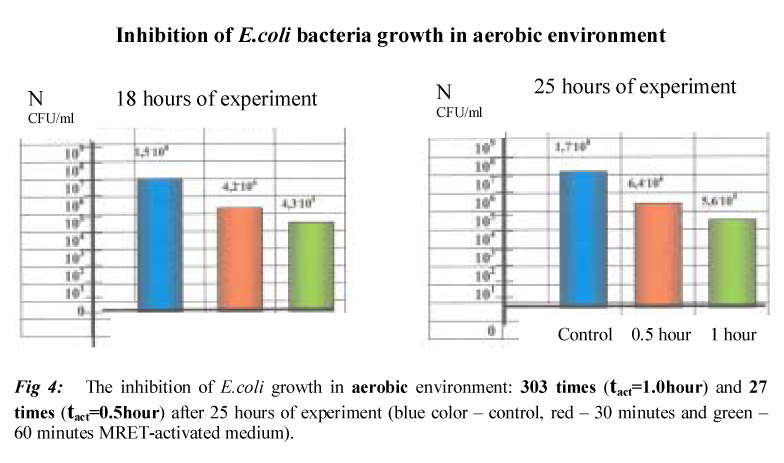
II The stimulating effect of MRET water on metabolic activity of Complex Microbial Associations in anaerobic environment
In order to simulate the environmental conditions similar to the conditions in the intestine of humans and animals the test on metabolic activity of microbial associations was conducted in anaerobic environment. Reductant activity is an integral characteristic of metabolic activity of microorganisms and it is measured with the help of Sodium Resasurine color indicator in the percentage degree of discoloration (purple = 0%, red = 50%, transparent = 100%). It was found that MRET-activated water substantially increased reductant activity of complex microbial associations during the first nine hours of experiment (Fig 11).
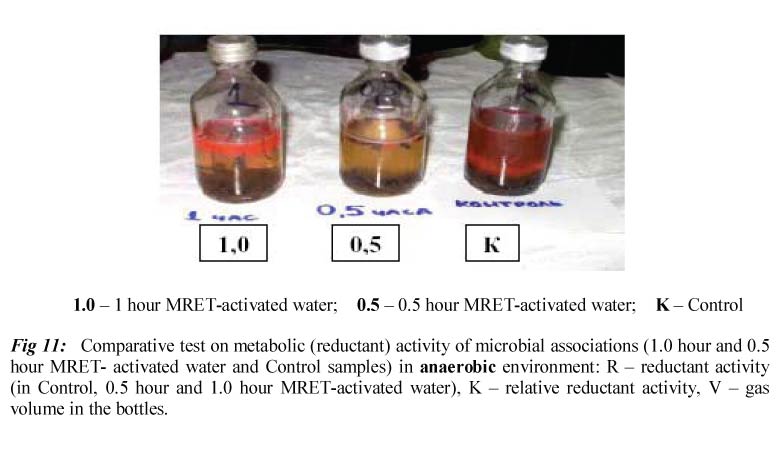
This experiment revealed that the optimum time of activation for the maximum increase of metabolic activity of microbial associations in anaerobic environment was 30 minutes. The same optimum time of activation was found in the process of inhibition of metabolic activity of E.coli in aerobic environment and in another investigation regarding the application of MRET activated water for preventive treatment and enhancement of tumor resistance in vivo.
Antibacterial effect of MRET water
Testing conducted at C.A.I. Environmental Laboratory, Carlsbad, USA revealed the significant reduction of the amount of total coliforms following the process of MRET activation. In the rainwater activated for 30 minutes the amount of total coliforms decreased by 86% after the process of water activation. This test confirms that MRET water acts as antibacterial agent, providing sterilization effect.
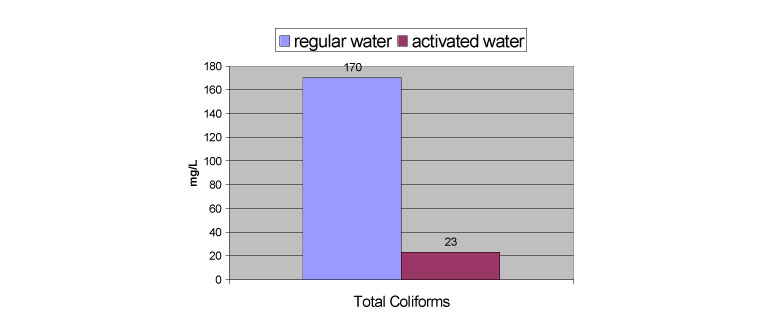
The effect of MRET water on the inhibition of growth of kallus cells (mutated psoriasis cells of botanical origin)
The experiment was conducted at Kiyv Institute of Plants Genetics of Ukrainian Academy of Sciences. Kallus cells are mutated cells of botanical origin with ability to produce uncontrolled, unlimited growth in the nutrient medium. The similar mutated cells of animal origin are known as psoriasis cells. The 30 minutes MRET activated water produced the strong inhibition effect on kallus cells and their growth reduced about 15 times (by 93%). In 60 minutes MRET activated water the growth of kallus cells reduced 1.4 times (by 27%).
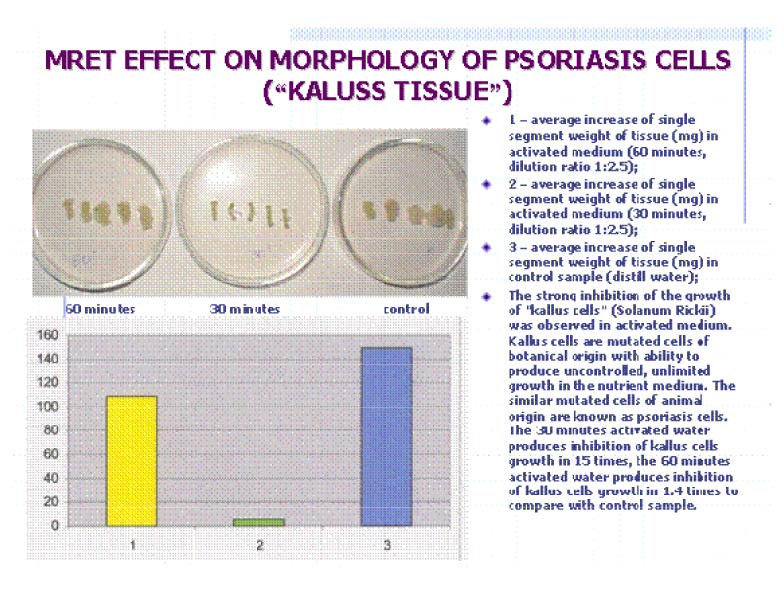
Live blood cells analysis of MRET water effect on morphology of Red Blood Cells
The live blood cells analysis was conducted at Health Manna Pte. Ltd., Singapore in compliance with the standard methodology. The comparison of the images with control ones indicated that the ingestion of MRET water substantially improved the morphology of Red Blood Cells. The images of the blood samples of subjects before the ingestion of MRET water show the patterns of Rouleau formations (cells are stacked forming worm-like pattern) which usually correspond to the symptoms of fatigue, shortness of breath, and poor blood circulation because red blood cells cannot carry enough oxygen. The images of blood samples of subjects in 20 minutes after the ingestion of MRET water show significant enhancement of Red Blood Cells morphology.
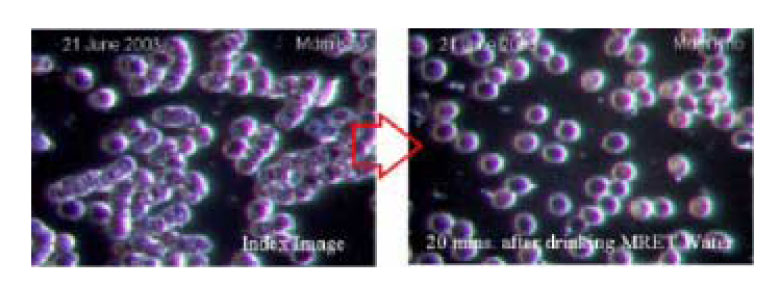
MRET water effect on growth of plants and seed germination
The examinations of influence of MRET activated water on plants was conducted during 3 months period at Kiyv Institute of Plants Genetics of Ukrainian Academy of Sciences. MRET activated water enhanced the growth cycle and accelerated the process of seed germination of several plants (particularly of cabbage, pumpkin, string bean, garden radish and peas).

Physical Properties of MRET Activated Water Related to its Biological Benefits
Viscosity of MRET activated water subject to very small tangent pressure decreases 300-500 times
The research conducted at Moscow State University, Russia on distilled water subject to tangent pressure showed that after MRET treatment the viscosity of water decreased up to 300-500 times compare to regular water in the area of very small magnitudes of tangent pressure. The anomalous viscosity of MRET water subject to very low tangent pressure confirms the high level of long-range dynamic polarizedoriented multilayer structuring of water produced with the help of MRET activation process: the high level of long-range molecular coupling (hydrogen bonding) inside the “layer” and very low level of molecular coupling between the “layers.”
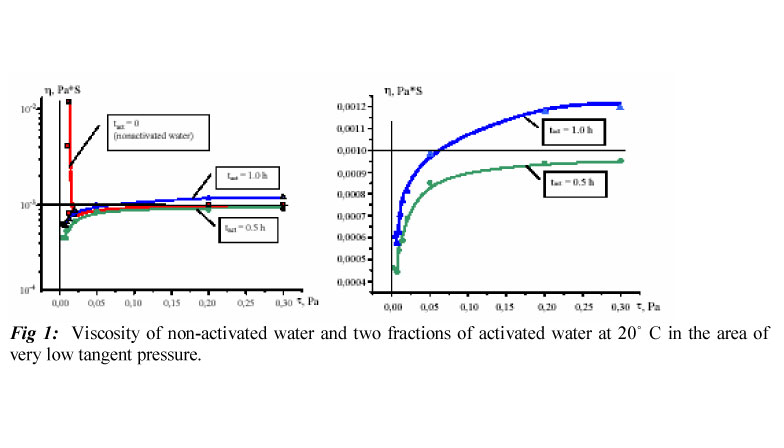
It is well known that cellular processes in biological systems are driven by the low energy of bio-chemical reactions inside and between the cells and cellular structures. Consequently, such processes create low tangent pressures along water surfaces and the membranes between the cells. Thus, the very low tangent pressures existing in biological systems contribute to the manifestation of anomalously low viscosity of MRET water. Due to its “super liquidity” MRET water easily penetrates through small porous and capillaries in the body. Based on this fact it is possible to conclude that MRET water may significantly improve the cellular membranes function as well as the function of blood circulatory system in the body.
Modification of the pH index of MRET activated water
The research conducted at Moscow State University, Russia revealed the oscillating and fluctuating character of pH values in distilled water depending on time, spontaneous fluctuations of geomagnetic field and environmental conditions, and other types of intracorrelation between physical and biological parameters of water. This experiment was conducted according to standard methodology with the help of Ionometer EV 74 (Russia). It confirmed that in MRET water activated for 30 minutes the pH index showed the tendency to balance closer to pH=7. This experiment revealed the tendency of the process of MRET activation for 30 minutes to reduce the acidity of distilled water compare to non-activated distilled water.
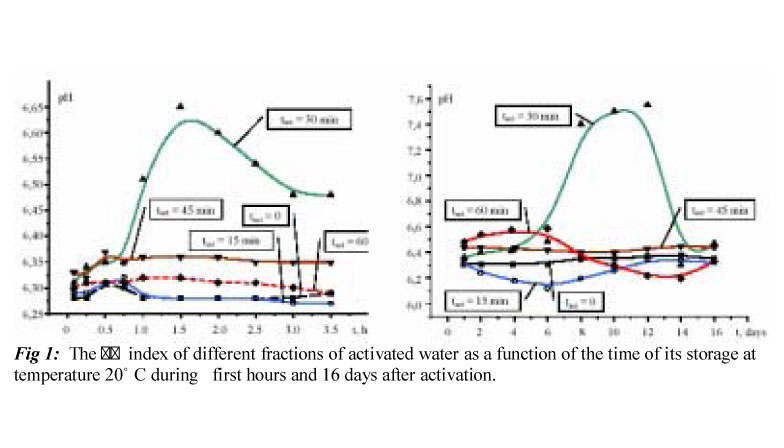
Reduction of free radicals in MRET activated water (and water is softer and pleasant to drink!)
Free radicals (ions) can affect the cellular function in negative way. Consequently, the reduction of the level of free radicals in the body leads to the enhancement of the body homeostasis and metabolism. Testing conducted at C.A.I. Environmental Laboratory, Carlsbad, USA revealed the significant reduction of free radicals following the process of MRET activation. In the water activated for 30 minutes the amount of ions of calcium decreased by 72% and the amount of ions of magnesium decreased by 18%. As a result, the hardness of water (combined amount of ions of calcium & magnesium) decreased by 45%. These results confirm that free radicals (ions) make bonding with long-range polarized molecular structures in MRET water and have less effect on the process of proper cellular function. The decrease of the hardness in MRET activated water contributes to its soft and smooth taste!
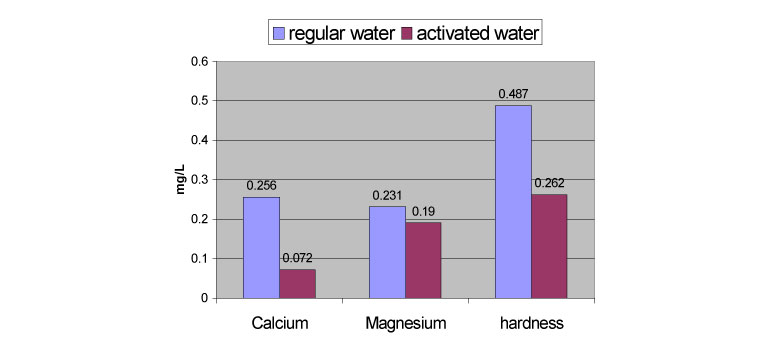
The process of activation increased the turbidity of water. The increase of turbidity illustrates that free radicals bonding with long-range polarized molecular structures of MRET activated water form sediments.
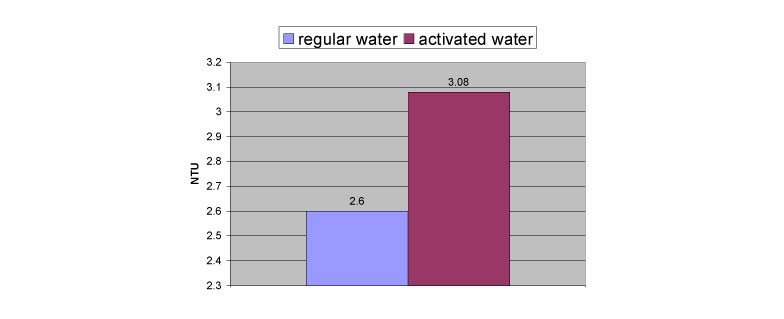
Nuclear Magnetic Resonance test confirmed the modification in water molecular structuring after MRET activation
The test was conducted at Numega Resonance Laboratory, San Diego, USA on three samples of MRET activated water compared with a sample of non-activated water from the same source. Experimental data revealed a consistent 2.5 times increase in the width of “proton peak” in the line of NMR absorption for the samples of MRET activated water compare to the sample of regular non-activated water. The increase of the width of “proton pick” characterizes the increase of proton dispersion and confirms the modification in molecular structuring of MRET water.
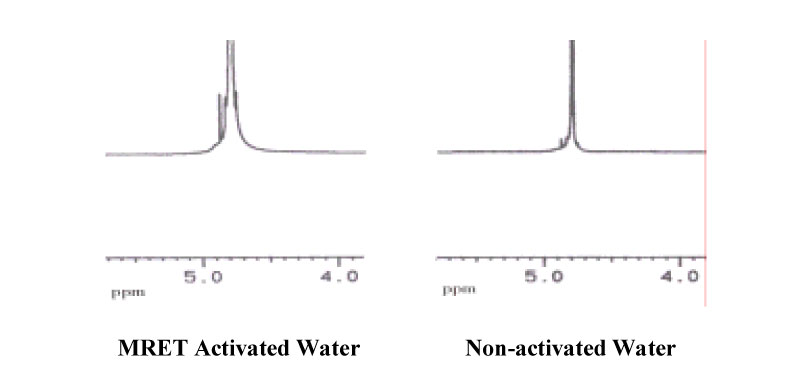
High voltage photography
This test was conducted at Global Quantech, Inc., San Marcos, USA. The High-Voltage photographs showed the enhanced Corona Discharge Effect (luminous fringes that appear around electrically conductive samples of water) in MRET water. The physical process of cold emission of electrons produces the Corona Discharge phenomenon. The emission of electrons in MRET activated water is more intensive compare to non-activated water. It means that the energy level of water molecules is higher. Due to the fact that no foreign substances were introduced to the water during the activation process, the enhanced Corona Discharge Effect could occur only as a result of structural changes in MRET activated water.
